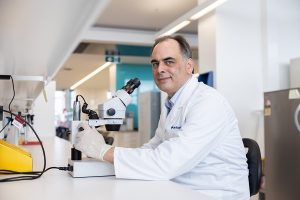“The eyes are the windows to the world, please keep mine open.” Eamon, 11
Imagine the heartbreak of discovering that your two beautiful boys, born profoundly deaf, now face the terrifying prospect of losing their sight as they enter their teenage years.
This is the harsh reality that Perth parents Bronwyn and Andrew are grappling with as they navigate life with Usher syndrome 1D, a cruel inherited retinal disease that robs individuals of both hearing and vision. For mum Bronwyn and dad Andrew, the diagnosis felt like their world had fallen apart around them.
“Before the Usher syndrome diagnosis, we’d come to terms with the boys being deaf and we were grateful they could see,” says Bronwyn. “So, to find out they faced a future being both deaf and blind filled us with terror, like our worst nightmare coming true.”
Hear from the family about their journey by watching the video above or by clicking here to view the video.
Time is of the essence, and we urgently need your help to drive our research forward before it’s too late for children like Eamon and Kealan.
Following the diagnosis, Bronwyn set about researching where to find the very best care for her boys moving forward, reaching out to contacts locally and internationally. When she received a call from her sister-in-law in the UK saying a Cambridge professor had recommended Lions Eye Institute Associate Professor Fred Chen, she was thrilled, as she already had an appointment booked with him for two weeks later. The help the boys needed was right on their doorstep, and they were about to learn that our world-leading research could potentially save the boys’ sight.

Eamon and Associate Professor Fred Chen
“That visit to the Lions Eye Institute turned my whole world around,” says Bronwyn. “They gave me hope that they were working feverishly on something that could help my sons, and that was all I needed to hear.”
What is Usher syndrome?
Usher syndrome is the most common cause of deaf blindness. Babies with Usher syndrome are born deaf and as they grow older develop the eye condition retinitis pigmentosa, which causes gradual loss of peripheral vision and eventual blindness. This usually happens around the teen years into early adulthood. For two boys with big dreams, including Eamon’s lifelong ambition to be a pilot and Kealan’s aspiration to become a palaeontologist, the potential impact makes Usher syndrome a heartbreakingly cruel disease.

Dr Samuel McLenachan
Dr Samuel McLenachan is leading the Usher syndrome research. The goal is to develop drug therapies for the various types of Usher mutations using lab-grown tissues for testing. The hope is that we can treat children with Usher syndrome before they develop blindness. We need to prevent the onset and progression of the disease because once sight is lost, it is gone.
“We collect skin and blood samples from patients with inherited retinal diseases like Usher syndrome, turn them into stem cells which we then turn into retinal tissue (known as a retinal organoid),” says Dr Samuel McLenachan. “This allows us to examine a replica of the patient’s retina, allowing us to observe any abnormalities within the retinal tissue and conduct tests on the effectiveness of the therapies we’ve developed – all without posing a risk to the patient.”
The family has also been actively fundraising, most notably with Eamon’s role as a Little Telethon Star, which contributed to the funding of Western Australia’s first stem cell robot. The robot is expediting our research by automating the cell culture work involved.
“It is not only children with Usher syndrome who will benefit from this research using the stem cell robot,” says Dr Sam McLenachan. “We’ll also be able to look at treatments for other inherited retinal diseases which cause vision loss and blindness.”
As Eamon and Kealan approach their teenage years, time becomes critical for advancing our research. They’re already beginning to show signs of losing peripheral vision, but thanks to this research, they still have an endearing, unwavering optimism for their future.

Eamon, Bronwyn, Kealan and Andrew
“My boys both have big dreams and all I want is for them to have the same opportunities to fulfil them as other kids do,” says Bronwyn. “Their future rests on this research, so in donating to this appeal, people are effectively giving them the future all children deserve.”
The future for children like Eamon and Kealan is in our hands. Their hope lies in a medical breakthrough, and whilst we have made progress there is still so much to be done.
The race is on. We need you to help drive our sight saving research forward by making a donation today.

